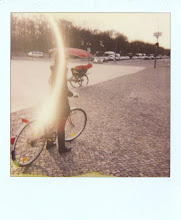I was asked recently if I believed in ghosts. My knee jerk reaction was “yes,” and technically it still is, but trust…
I am not talking some Sixth Sense, out-to-settle-some-unfinished-business, nebulous-embodiment-of-someone-you-used-to-know, creepy type of ghost.* I’m talking about the manifesting but not actually existing at that moment in time, faint trace of something type of ghosts – the ghosts that stem from an experience, a connection, a feeling, that leave a lasting impression on your general mind state. Not entirely unlike Robert M. Pirsig’s ghosts.
*But we can certainly have a conversation about these types of ghosts and how their claimed existence says more about how we are afraid of death than anything else… I’m just saying!
These ghosts I see all the time. They haunt me and find their way into my daily life and private existential conversations between my protons, neurons, and electrons often. To have them with me is not a burden whatsoever, but a blessing. The best ghosts appear after you encounter a new experience, reminding you of the power of that breath, that word, that look, that person, that place. Right now, I feel like my ghosts are joining forces, banding together into a sort of Voltron super-ghost to challenge my development for the better. As of late my Voltronic ghosts are emphasizing:
“Simplicity is about subtracting the obvious, and adding the meaningful.” Just because something smacks of being not as advanced or developed, doesn’t mean that it’s not evolved or contains the very essence of advancement and development.
The Ouroboros is an ancient symbol that represents the cyclical nature of birth and death, creation and destruction, and beginning and ending.
Out of respect for these tandem concepts, the following are the highlights of my adventure in Thailand, or as I would like to think of it, Adventures in the [Unintentionally] Profound.
Humbleness / Humility
When I asked how most Thai folks greet each other, after they “Wai” (hands in prayer, slight bow), the three most frequent questions are:
- Where have you been?
- Where are you going?
- Have you eaten yet?
It could be said that these questions gauge wisdom (the accumulation of knowledge), sense of perspective (what direction are headed, how far ahead are you looking), and demonstrate a human connection (I care that your basic needs are meet), respectively. These questions point you, at the very least, to concrete answers. Where people can judge you on how you act and the way you conduct yourself rather than by the heat of the air you expel when trying to tell them about yourselves. Juxtapose this with the United States:
- How are you doing?
- How’s it going?
These questions assume that receiver of the question knows their internal state well enough to speak on it. Kind of cocky, no? But, I do appreciate that they invoke the abstract. I’ve grown to appreciate the quiet humbleness that accompanies the understanding of how past actions and behaviors are affected by our attitudes and have tried to practice as much as I preach while maintaining my eyes on the metaphysical, abstract prize (figuratively speaking, of course). In order to understand the ways I’ve been affected by my visit to Thailand, I felt it was necessary for me to set up / qualify my thoughts:
Life in Context
We are all products of our environment, or at least in a working relationship with the environment. An extension of humbleness and humility, ghosts of experience past will no longer let me go quietly through life ignoring the constant interaction with my surroundings.
When the environment exerts its energy and we notice it:
When we exert energy to understand the environment around us:
When the energy exerted and created cannot be put into a narrative:
From all my ghosts and my conscious self: Sa Wat Dee Kah for your consideration. This was my Thailand.
------
Ouroboros, continued:
In a gesture that I thought was incredibly sweet, my mother asked me if I was going to write a “Part 9.” I was in the process of sorting out how I wanted to wrap this series up, letting my thoughts marinate until the spirit moved me, so I said, “Probably.” “Probably” fishing for requests for more writing is more like it; she shut that down quick with the following statement.
In the Thai culture, the number 9 is a lucky number. We always try to make things in 9, so you should do the same.
Never mind what I wrote about. I just needed to complete the circle. Thanks, mom.
In all seriousness, I am actually quite pleased that my 9th entry will be both an ending and beginning. Ending of a series, of the written word, and the beginning of conversation. I look forward to taking this discussion off the written page / typed screen into the space between us... if you’ll have me.
Side note: In Thailand, the pronunciation of the word “nine” is the same as “progress” and “rice.” Pretty much staples in the Thai culture. Additionally, as Buddhists, most Thais follow the tradition of valuing odd numbers, especially the number three. 9 = 3 x 3. Feel me? The Thai Transport Minister certainly does…

